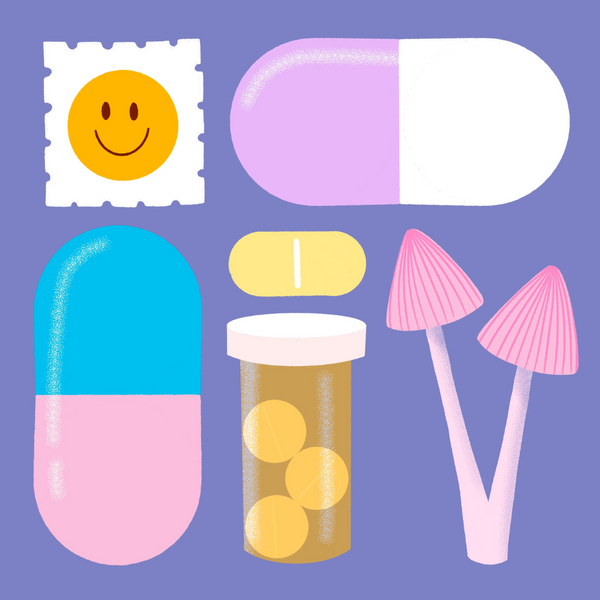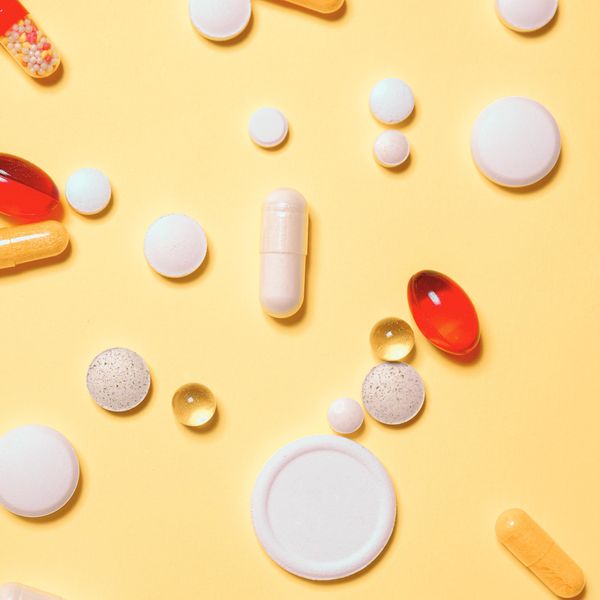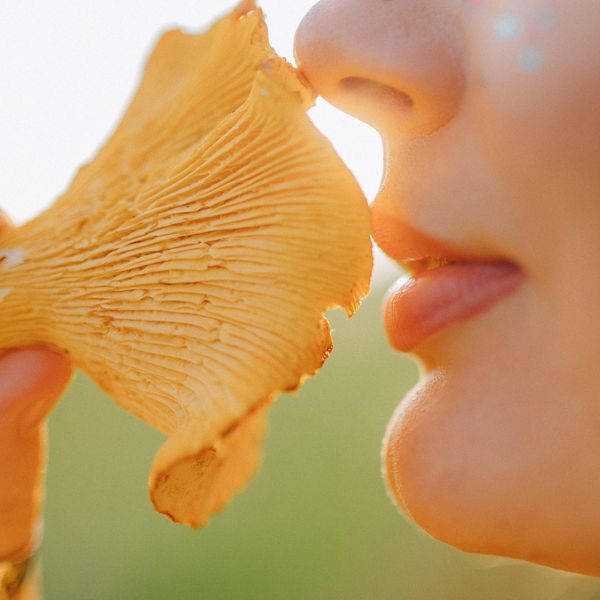Unpacking the mystery behind magic mushrooms, microdosing, and more.
What's The Deal With Psychedelic Therapy?

Meredith Holser is B+C's resident affiliate writer. Meredith enjoys writing about a range of topics, but she's adopted e-commerce writing in all its many facets. Outside of work, you can catch Meredith hiking, trying new recipes, and dreaming about having a yummy little treat.
Though nothing knew, magic mushrooms and queries about their use cases, risks, and success rates have seeped into our collective consciousness over the last few years at an increasing rate. Between the rise of microdosing moms, Prince Harry’s candidness on his psychedelic usage to cope with grief, contemplative and informative documentaries like Fantastic Fungi, and groundbreaking studies on the therapeutic use of psychedelics, mushrooms and the like are becoming a little bit less of a mystery each day.
In a society of growing mental health problems, researchers, therapists, and patients alike have had the revelation that traditional therapeutic treatments aren't a one-size-fits-all solution. So what’s the deal with these alternative psychedelic-assisted therapies? We answer your questions about these newfound treatments, talk with experts, review the benefits and potential risks of psychedelics, and explore the future of how we address mental and physical health for all.
What are psychedelics?

Psychedelics are powerful psychoactive substances that alter a person’s perception, mood, and cognition, and substantially change the user’s state of consciousness. Psilocybin (or “magic mushrooms''), MDMA, LSD, and ketamine are the primary psychedelic substances that are recognized in the mainstream as well as the medical field.
Psychedelic compounds have existed and been ingested for their benefits since the dawn of time, offering uses in prehistoric cultures’ shamanistic rituals, and indigenous healing traditions. They’ve been an integral part of human history a lot more than people initially think, especially with women at the forefront — notable figures like Maria Sabina and Valentina Pavlovna Wasson are just a few of many that pioneered and contributed to the popularization and therapeutic study of psilocybin mushrooms.
Are psychedelics legal?
The legality behind psychedelic compounds in the US is tricky. These drugs get a bad rap for their use in recreational contexts, which definitely complicates things, and no doubt impacts the attitudes and stigmas surrounding them.
Most psychedelics, with the exception of ketamine, are categorized as Schedule I drugs by the FDA, meaning that they aren't accepted for medical use. Ketamine, though not yet widely accepted as a psychedelic drug, has been used in the medical field as an anesthetic for over 50 years, and is FDA approved when prescribed by a physician. Psilocybin mushrooms are legal in some US cities and states, and are decriminalized in others.
With ongoing explorations and conversations about the benefits of psychedelics in the therapeutic space, legality and criminalization for use is changing.
What is psychedelic therapy?

Photo by Anna Shvets / PEXELS
Psychedelic therapy is an assisted therapy technique that employs psychedelic compounds to encourage mental wellness. The process typically intertwines with traditional talk therapy to facilitate healing and success. Psychedelic therapies have the potential to treat depression, anxiety, PTSD, and addiction far better and faster than other routes aimed to treat mental illnesses, such as medicating via SSRIs (a common antidepressant).
Psychedelic therapy really aims to bridge the gaps between current limitations in treatment. A big part of that is moving away from a “symptom management” mindset, and instead, targeting the root causes of mental health challenges, says Payton Nyquvest, Co-Founder and CEO of Numinus, a Canadian provider that's integrating psychedelic services into therapeutic practice that's also investing in clinical research.
Beyond aims to heal mental illness, psychedelics in a therapeutic and medicinal context can also improve cognitive function and fine motor skills, and help with neurological disorders like Alzheimer's, Dementia, and Parkinson's. This excites mycologist Paul Stamets, a highly regarded thought leader, speaker, entrepreneur, and researcher in the psychedelic space, whose work has contributed greatly to the paradigm shift in the world of mycology.
"What I'm most excited about is the neuroregenerative properties of psilocybin, to increase our ability to think, to be more coordinated," Stamets says. "We have really suggestive exciting evidence on the improvement of psychomotor skills, and it translates to all sorts of behavioral improvements, externally and internally in terms of cognition. Think about how many people fall as they get older and break their hip, go to the hospital, get an infection, and die. That narrative, unfortunately, is way too common."
Why psychedelic therapy?
The goal of any therapeutic treatment is to facilitate healing. Recent research increasingly acknowledges that traditional approaches to mental health treatment are just not working for patients. According to a 2021 phase 3 study, 40-60% of users did not respond to SSRIs. Aside from their poor performance, SSRI drugs have tons of hurtful side effects such as weight gain, loss of libido, anxiety, and more, says Ronan Levy, Co-Founder and CEO of Field Trip Health, a provider offering psychedelic programs, from in-person to online and self-guided, to help create a healthier, happier world.
“You have drugs that don't work, with lots of side effects, in a mental health crisis, and you have a large population of people who are not served by these approaches," Levy says. “Even for the people who do benefit from antidepressants, the improvements tend to be fairly marginal.”
A key difference between psychedelic therapies and traditional routes to facilitate mental health improvement is that psychedelic therapies have longer lasting, more effective results. One clinical study found that participants who received psychotherapy, alongside ingesting psilocybin, had significant decreases in their depression up to a year after the study.
Though there are ground-breaking studies finding significant results, it’s also important to note that these are highly controlled situations that can also be impacted on a case-by-case basis.
How does the psychedelic therapy process work?

Photo by DS stories / PEXELS
Though different mental health providers may have different protocols, most psychedelic therapy processes first begin with an assessment phase, where you, the patient, are evaluated as a fit for the treatment on an emotional and physical level. If you’re deemed a good fit for treatment, ingestion of the substance comes next. Trained professionals help guide you through this time, providing you with insights on targeting the mental challenges you want to face. After the fact, many providers implement an integration stage of talk therapy to sustain the benefit of the psychedelics.
Though the process sounds very rigid and demanding, the experience can be quite magical. Recent research has shown that ingesting psychedelic compounds facilitates an interesting process called synaptogenesis. This essentially means that the brain can heal itself, via repaired or renewed synapses. It sounds very science-y, and it is, but this phenomenon is very real and very cool. Improved neuroplasticity from psychedelic processes not only lays the framework for you to form new thought patterns (similar to CBT (Cognitive Behavioral Therapy) processes), but as Stamets addresses, can help the brain fight neurodegenerative diseases and disorders.
What are the drawbacks? Is it safe?
Though they can be managed well in certain settings, the reality is that psychedelics are still very powerful compounds – we’re talking about huge changes in brain chemistry and one’s overall worldview. There will always be a higher risk when using outside of a therapeutic or clinical setting.
The myth that these substances are highly addictive doesn’t hold up against current research and treatment that has proved it’s oftentimes quite the opposite. Psilocybin has been studied for its effects to help cure alcohol addictions, with promising results.
In therapeutic spaces, ‘bad trips’ are rare, and thanks to training structures set up within therapeutic programs, the risk of overdose and abuse of psychedelic compounds is very low. The process can definitely present big challenges for the user depending on what they’re facing, sometimes pushing them to the edge of the drug’s capabilities. Though this realm can definitely be mysterious and scary, the experience can oftentimes be “the most cathartic, and can often lead to the best breakthroughs,” Levy says. If a larger dose is intimidating because of those challenges, then microdosing can still benefit you.What is microdosing?
Microdosing is the consumption of a very small fraction of a hallucinogenic psychedelic drug dose — about 1/20th to 1/10th. The microdose is typically low-risk, and is not enough for you to feel the visceral effects of the drug, but its benefits still come into play.
The practice of microdosing benefits the user by boosting their creativity, and improving their moodand physical performance. It's also leveraged to target mental health struggles such as anxiety, PTSD, or addiction.
Beyond mental health uses, microdosing also provides the potential for optimization against an aging brain and body, says Stamets. The practice is "helping neurons regrow, especially in an age where we suffer from neurodegeneration."
In the field, this property of regrowth is quite revolutionary. Doses of psychedelic drugs can combat against the effects of neurodegenerative diseases and disorders which are very challenging for the patient, and oftentimes heartbreaking for those close to them.
How do I know microdosing is right for me?
Though the benefits of microdosing are enticing to anyone looking to improve their overall wellbeing, it's not a one-size-fits-all venture. The approach for psychedelic treatment at a micro- or macro- dose and its efficacy really depends on the person, says Dr. Pam Kryskow, a founding member of the Psychedelic Association of Canada. She is actively and very passionately involved in the potential of psychedelic medicines, and contributes to countless credible research studies surrounding the topic.
"People are individuals, and they need individual therapy, depending on their needs. One person may do very well with a single psilocybin session and that's it — that's all they need for the rest of their life," Dr. Kryskow says. "Other people may periodically over time benefit from therapeutic sessions, maybe somebody that has a long history of trauma... So it really depends. It's personalized medicine."
What's keeping psychedelic therapies from becoming accessible and accepted?

Photo by Nataliya Vaitkevich / PEXELS
Aside from the tricky legality behind psychedelic drugs, society still has a ways to go in order for the compounds themselves and treatments to become more normalized. People still recognize the compounds as highly dangerous and addictive, so changing the attitudes about them is one big step, Levy says:
“Even though data is refuting a lot of the things that we've been taught [about psychedelics], it takes a while before attitudes shift, both at a grassroots level, but also in the medical field.”
Scientific research backing the numerous benefits of psychedelic medicine is far enough along that those still embracing the stigmas behind the drugs are simply "stuck in the old school," says Dr. Kryskow. "Physicians and scientists should be angry that these medicines have not been in our toolbox for the last 20 years. Our patients have been suffering. These medicines are fantastic medicines for certain parts of our patient population, so the people that are stuck in the stigma, unfortunately, are behind the curve."
In the case that one does release the negative stigmas and personal biases behind psychedelics, and is looking to opt for mental health therapies with their use, there is still a higher cost associated with treatment that could limit accessibility. Available treatments could cost hundreds per session. Payton Nyquvest recognizes the realities of affording treatment in the first place:
“We're used to mental health treatments where it's a smaller, regular commitment of money, over a much longer period of time. These psychedelic therapies are a larger upfront investment, but could more quickly and more robustly bring someone to a much better, happier life.”
The future of psychedelic treatment
Tons of ongoing research continues to prove that psychedelic drugs aren’t as dangerous as we thought, and that they can be indescribably beneficial to those who take them for mental health treatments, as well as new generations at large. MDMA and psilocybin therapies are expected and hoped to be approved for treatments by this year or early 2024, aiming to further refute negative stigmas and make the benefits more accessible. Ways to measure the efficacy of psychedelic therapy also continue to be developed and verified.
"Psilocybin makes nicer people," says Stamets. "We're seeing very strong evidence that not only the PTSD cycle can be broken, there's very strong signal saying that psilocybin use reduces partner-to-partner violence. Think of that — psilocybin prevents people from become abusers. They lower trauma for the next generation. We're in a phase change."
At a clinical level, companies making investments in psychedelic research essentially fuel a positive feedback loop: the more interest and investment there is in the realm, the more frequently clinical trials and research will occur, which empowers fact-based acceptance and healing at a wider level.
"If I could look into the future, and I see the future I hope for, I hope that we see a wide spectrum of availability," says Dr. Kryskow. "As long as they're available in a safe way, I think people should have the choice of how they want to use them. And I don't think it's an either or, I think it's all-inclusive."
Beyond the nitty-gritty science behind psychedelics, whether you’ve experienced these compounds for yourself, or are just plain curious about them, there’s truly an aspect of magic within them that’s worth acknowledging, says Levy:
“[Psychedelics] create a kind of window into experiencing the profound, or getting in touch with a sense of wonder that a lot of us lose as we mature and go from childhood to adulthood. Reconnecting to that sense of wonder, that sense of mystery, can in many cases, be the thing that helps people break their funk.”
Read more insightful takes on mental health and wellness onBrit + Co, and make sure you speak with a medical professional if you're interested in exploring psychedelic therapy for yourself.



















